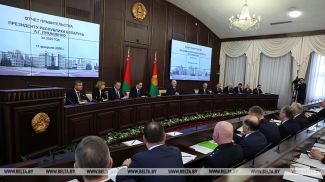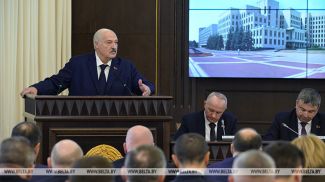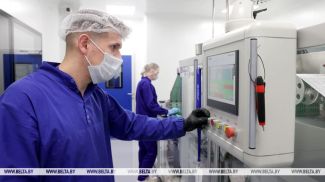ASTANA, 12 October (BelTA) – After a two-day official visit to Tajikistan Belarus President Aleksandr Lukashenko arrived in Kazakhstan's capital city of Astana where the sixth summit of the Conference on Interaction and Confidence Building Measures in Asia (CICA) and a session of the CIS Heads of State Council will take place on 13-14 October, BelTA has learned.
Aleksandr Lukashenko took part in a Shanghai Cooperation Organization summit in Uzbekistan less than a month ago. Participants of the summit expressed univocal support for Belarus' accession to this international organization as a full member. Belarus' interest in the Asian vector is understandable and logical. In the past Belarus worked hard to establish cooperation with many countries in the region, including major players like China and India. Asian partners, who have repeatedly confirmed their reliability, are naturally becoming priority interests for Belarus in view of the sanctions-fuelled pressure of the West and the unwillingness to have a constructive dialogue.

As for the Conference on Interaction and Confidence Building Measures in Asia, it is not a genuine international organization yet. However, in terms of the number of participants it is much larger than the Shanghai Cooperation Organization and represents a good platform for exchanging opinions about the situation on the continent and in the world as a whole.
What is CICA and why is this platform important for Belarus?
The Conference on Interaction and Confidence Building Measures in Asia (CICA) is an international forum that unites countries of the Asian continent. The organization endeavors to enhance mutual relations and cooperation of Asian and Eurasian countries with a view to ensuring stability and security in the region.
According to the news agency Kazinform, taking part in the sixth summit of the Conference on Interaction and Confidence Building Measures in Asia will be 11 heads of state, the vice president of Vietnam, the vice president of the People's Republic of China, and a number of ministers. A total of about 50 delegations are expected to turn up.
Kazakhstan was the initiator of the CICA's foundation 30 years ago – in 1992. The first summit and the second one took place in Almaty in 2002 and 2006. The third one took place in Istanbul in 2010, the fourth in Shanghai in 2014, and the sixth in Dushanbe in 2019.
Since its inception the organization has grown larger and now includes 27 member states and 9 observer states, including Belarus. It covers over 90% of the territory of Asia.
Two main items are on the agenda of the summit: an updated catalog of confidence-building measures in Asia and the transformation of the conference into a genuine international organization.
Belarusian Minister of Foreign Affairs Vladimir Makei told media: “The Conference on Interaction and Confidence Building Measures in Asia is an important venue for meetings of heads of state, who represent a significant part of the planet. It is a venue for discussing topical issues, which are related not only to politics but also to trade and economic interaction, interaction in fight against crime, terrorism, and other areas. This venue is very important and interesting for us. The more Belarus gets involved in the operation of various regional, international integration associations, the more beneficial it will be for our country.”
Vladimir Makei said that the Belarusian side is interested in the possibility of securing concrete agreements on various matters, including various humanitarian affairs, trade and economic aspects, and the issues relating to the threats the mankind faces.
In turn, Ambassador Extraordinary and Plenipotentiary of Belarus to Kazakhstan Pavel Utyupin pointed out that converting the conference into a genuine international organization is on the agenda. Although the scope of the conference partially coincides with that of the Shanghai Cooperation Organization, countries enjoy much broader representation within the framework of the Conference on Interaction and Confidence Building Measures in Asia. The CICA offers an alternative venue where countries can discuss topical issues and express their points of view albeit they can be diametrically opposite at times. “But they can attempt to hear each other. Today the most important thing in diplomacy is to continue dialogues and try to get the point of every individual country across to each other. Regretfully, many traditional platforms do not allow hearing each other sometimes and sometimes disallow countries to say what they have to say despite the fact that these platforms have a higher status,” the diplomat noted.
The ambassador reminded that due to Western pressure representatives of Belarusian delegations had faced artificial restrictions, including the denial of visas for participation in international events. “These artificial restrictions should not exist. Platforms [like CICA] are valuable because we can try to work out complicated solutions, which are necessary for maintaining peace, stability, and further sustainable growth,” Pavel Utyupin stressed.
The diplomat is convinced that such platforms demonstrate what genuine democracy should be to make a dialogue possible.
The CIS summit: from humanitarian cooperation to security
A meeting of the CIS Heads of State Council will also be held in Astana on 14 October. Most leaders of the CIS countries already had an opportunity last week to "compare notes" at the informal CIS meeting in St. Petersburg. In Astana they will review the issues taking into account the discussions last week. Traditionally, the summit will be preceded by a meeting of the CIS Ministerial Council. Its agenda is quite large: about two dozen items. The foreign ministers are set to discuss a plan of CIS multi-level ministerial consultations for 2023, the status of implementation of the interstate program "CIS Sports Capitals", the setting up of the commission of ombudsmen for the rights of the child, measures to implement the strategy for international youth cooperation, cooperation in the field of training military personnel for the air force and the creation of an interstate working group to draft an international legal act defining the procedure for obtaining/providing information from the motor vehicles databases.
The agenda of the CIS summit is going to be as big. This is the first meeting to be held in person since 2020. "All in all, the heads of state are set to consider a dozen and a half issues," said Sergei Lebedev, Chairman of the CIS Executive Committee.
Traditionally, the heads of state will first exchange views on topical issues of the Commonwealth of Independent States in an one-on-one meeting. The role of the CIS Inter-Parliamentary Assembly in the development of the CIS will be discussed in an extended meeting.
"The CIS IPA is an influential international inter-parliamentary organization, recognized throughout the world and occupying an important place in the system of CIS bodies. An equal inter-parliamentary dialogue in the IPA takes into account the mutual interests of the CIS countries and is aimed at solving common topical issues of the CIS development. In this context, it is impossible not to note the role and contribution of this organization to the development of the legal framework for multilateral cooperation in the CIS," Sergei Lebedev emphasized.
Plans are in places to sign 10 documents on large-scale interstate cooperation at the CIS summit. It is expected that the Council will support the initiative of Kazakhstan President Kassym-Jomart Tokayev to set up an international organization under the auspices of the CIS to support and promote the Russian language. "This is especially true in the conditions of total Russophobia which is artificially promoted in a number of countries today," the chairman of the CIS Executive Committee said.
In terms of humanitarian dimension, the CIS Heads of State Council plans to adopt a decision on thematic years in the CIS and to launch the interstate program "CIS Capitals of Culture” in the Russian Federation in 2024. It is expected that the heads of state will support the initiative to declare St. Petersburg the CIS Capital of Culture in 2024.
A number of important decisions will be made in the field of security in the CIS states. Plans are in place to adopt a program of cooperation in the fight against terrorism and extremism for 2023-2025.
Economic cooperation will not go unnoticed. The CIS Heads of State Council will be briefed on the status of the draft agreement on free trade in services. Its main goal is to ensure the sustainable development of the free trade zone in services and goods and to create more favorable conditions for further growth of the economies of the CIS member states.
Bilateral track with Kazakhstan
The head of state's visits to any country, even if they are to participate in international forums, are a very good reason to dwell on the development of bilateral cooperation. Belarus and Kazakhstan have a long history of relations and a wide range of joint projects.
According to Ambassador Pavel Utyupin, Belarus has traditionally promoted its mechanical engineering, manufacturing, and agro-industrial products in Kazakhstan. Belarusian goods are well-known and in high demand in Kazakhstan. The countries however have long gone beyond that. They now develop joint production and share competencies. They do it in the production of tractors, harvesters, trucks and agricultural machinery. “This is a higher level of mutual trade, cooperation, based on joint production,” said the diplomat.
For Belarus it is profitable to sell its products and secure orders and new contracts. Kazakhstan's enterprises have been gradually increasing localization. They produce something using Belarusian technologies themselves and buy the rest in Belarus. The benefits are mutual, especially taking into account the prospects of promoting joint products to third countries.
Pavel Utyupin said that in 2021 Belarus and Kazakhstan posted a record-high trade of over $1 billion, and that was only for goods, not including services. On one hand, the two countries reached this milestone because Belarus did not stop production during the pandemic and had the opportunity to saturate the demand when the markets opened. On the other hand, it was thanks to recognition of Belarusian goods in Kazakhstan. The third factor was the two countries improving their cooperation through the development of joint productions.
A new plant is currently built in Kazakhstan's Kostanay to launch full-cycle production of cabins for the joint production of tractor machinery. The production capacity is huge. The range of products is expanding. Recently a trading house of Minsk Motor Plant has been opened in Kazakhstan, and there is a great potential for cooperation here as well.
The first area for increasing cooperation is to increase the number of cooperation projects. The second one lies in the field of trade - the network of stores of the Belarusian products is expanding. The coverage of consumers increases, and trade volumes grow. Here we are talking not only about food products but also about light industry products, furniture and other goods.
Belarus also offers its experience and technology in agricultural production to Kazakhstan partners. Dairy production and construction of modern farms are especially important for the country today.
There are proposals in the construction sector as well. “There is an idea to make a Belarusian quarter in Astana. Such negotiations are underway to enable Belarusian builders offer their services here by analogy with the experience they have gained in the projects implemented in the Russian Federation. On one hand, we can ensure there a Belarusian quarter there and, on the other hand, show our best practices in construction,” the ambassador said.
In his words, the construction of a nuclear power plant is also considered among large-scale construction projects in Kazakhstan. Here, the services of Belarusian builders and the experience they gained during the construction of the BelNPP may be in demand there.
There are a number of other areas of interest, including cooperation in the optoelectronic industry.
Today the Belarusian diplomatic mission views the level of trade of $1 billion as a base on which the two countries will build on in the future, realizing the full potential of bilateral cooperation.













